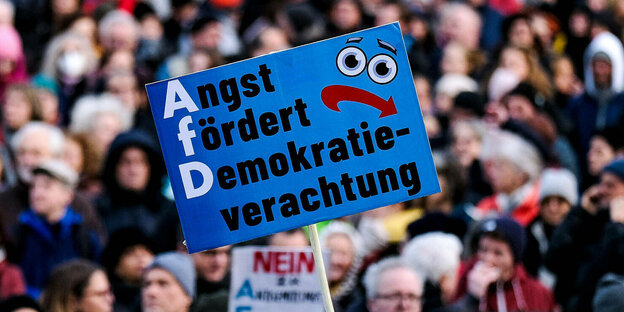The media debate about the AfD is always dominated by the question of what it uses and what it does not use. Does this benefit journalism?

Hundreds of people demonstrate in Frankfurt am Main against the far right and the AfD Photo: Florian Wiegan/Eibner press photo/imago
The question “Cui bono?” It is considered disreputable and as unpleasant as someone blowing their snot on the subway. On the one hand, it's okay to ask this question; even Adorno recommended it as part of the critique of ideology. But it smacks of conspiracy, especially when the word “really” is inserted before the question mark in the phrase “Who benefits from it?” This suggests that the person who benefited from the event could also be its secret author.
In the case of the AfD, the conspiracy is a little different. But the question of whether this or that benefits, helps, harms or weakens the AfD is drowning out everything else these days. To such an extent that I wonder who really benefits from constantly asking whether this or that benefits the AfD.
As soon as people gathered for the demonstration against the AfD, the first ones were already thinking: “If in the end this does not benefit rather than harm the AfD.” FACE Immediately after the first big weekend of demonstrations he learned that the demonstrations, the Correctiv investigation and the debate over the ban were not harming the AfD, but rather “helping” it, writing that “somewhere in Berlin there is an unfortunate postman which sends between 130 and 150 people”. Every day “we have to drag membership applications to the AfD federal office.”
The colleagues of the FACE We have certainly checked whether these AfD figures and justifications are correct. You will probably also have asked the postman if so much mail really arrives and you will probably have investigated beforehand that applications to join the party are not mainly received via the big online button on the AfD website. Colleagues certainly did not conduct their benefit analysis based simply on the information provided by the AfD. But your report says this.
The history, the narrative, the framing of the AfD
In the early years of the AfD there was debate about whether reporting on this party would benefit it, but now it seems that there is nothing that does not benefit the AfD.
Correctiv research? “Rights benefit from revelations” (taz).
The staged reading of the Correctiv investigation? “It does not harm the AfD. Otherwise” (World).
“Mood creation”? “This only benefits the AfD” (political scientist Ursula Münch).
The “enemy image of Berlin”? “Only AfD benefits” (Mirror).
The “weakening of the CDU due to political castration”? “Not suitable to contain AfD (FACE).
The debt brake? “Help the AfD” (SZ).
The debate about clans? “This only benefits the AfD” (Minister of the Interior of North Rhine-Westphalia, Reul).
At least there are still minimal restrictions: “A high level of CO2-The award mainly benefits the AfD” (Handelsblatt).
Sometimes it is cryptic: “Tough on populism: that only helps the AfD!” (FACE).
Sometimes generalist: “This whole day only benefits the AfD” (Markus Söder).
And if nothing else occurs to you: “Continuing as usual in the Merkel style only helps the AfD” (DiEM25).
Highlights: “Whoever argues at AfD level helps AfD” (ntv).
It was the AfD that initially gulped after the Correctiv investigation, the first demonstrations and the renewed debate over the ban, whose poll numbers fell, but which then regrouped and laughed out loud and shouted: You are only making us stronger! This phrase is the history, the narrative, the framework of the AfD.
Maybe the future will prove him right, maybe not. Until then, journalists in particular should not just parrot what the AfD says. This harms one thing in particular: journalism.